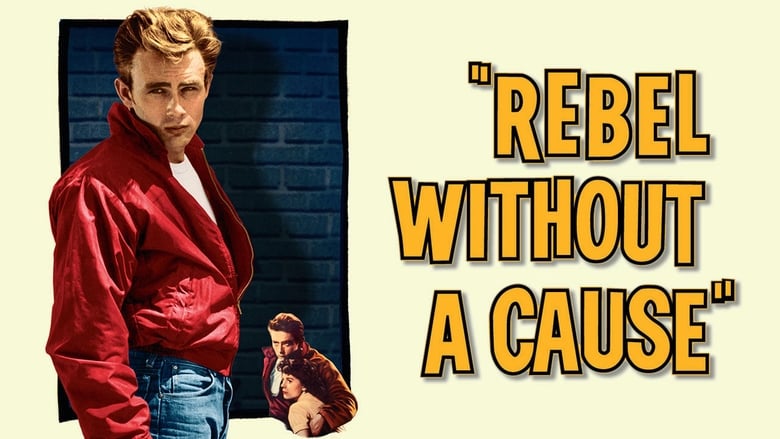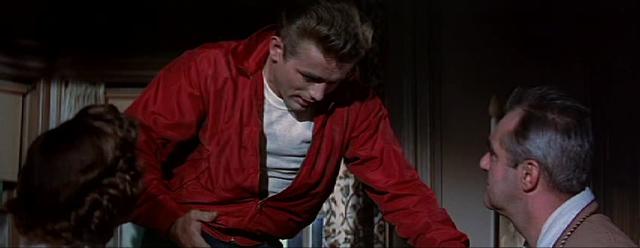← Back to Reviews

in
Rebel Without a Cause
Hailed as an instant classic upon its 1955 release, Rebel Without a Cause is beginning to show its age and is the proven source of every teen movie cliche ever employed onscreen, but is still riveting entertainment because of the three lead performances, the iconic James Dean in particular, in the role for which he would always be identified.

James Dean began acting in television and did a few bit parts in films, including 1952's Has Anybody Seen My Gal? before he was given a chance with his first leading role in East of Eden, which earned him a lead actor nomination. He followed that performance with this one, playing Jim Stark, a restless and angry teen who has just moved to a new town with his troubled parents (Jim Backus, Ann Doran) and finds himself labeled an outsider at his new school, but eventually finds special alliances in fellow troubled teens Judy (Natalie Wood) and Plato (Sal Mineo).

Nicholas Ray's contribution to this film as writer and director often gets overlooked in the shadow of three lead performances, but it shouldn't be because this film pretty much introduced a new film genre to moviegoers. This was truly the first "teen angst" movie ever made, giving America's youth an angry and defiant new voice that they hadn't been allowed prior to this film. This was something completely foreign to 1955 filmgoers and it not only struck a chord with them, but filmmakers have been trying to duplicate it ever since.

The screenplay is rich with daring innovations on classic movie characters that we really hadn't seen before. The twisted marriage of Jim's parents...the weak-willed husband so whipped by his wife that you can serve him on pie. And then there's the tortured and tragic Plato...the hero-worshipping pal to Jim Stark who has found a savior and possibly more in Jim Stark. Yes, it was 1955 and even though they don't come out and say it directly, the character of Plato is homosexual and is in love with Jim. He has a photo of Alan Ladd in his locker. He keeps inviting Jim over to his house to hang out because his parents aren't home. In interviews, Ray stated more than once that if he were writing Plato now, he would come right out and say that Plato is gay. Then there's Judy...the girl who is peer-pressured into hassling Jim even though her heart isn't in it, but quietly finding Jim to be the man she could really connect with.

The concept of peer pressure has never been so effectively captured on film. When Buzz challenges Jim to a "chickie" fight, out of fear of looking weak in front of the other kids, agrees to the fight without even knowing what it is. I'm pretty sure the game of "chicken" was the inspiration for the "Thunder Road" scene in Grease. The scene in the planetarium also got a proper homage in the Oscar-winning musical La La Land.

Speaking of Oscars, there was some interesting stuff going on here...Wood was nominated for Supporting Actress and Mineo was nominated for Supporting Actor, but Dean was overlooked for Lead Actor. And even though this was his most famous role, he did receive lead actor nominations for his other two lead roles, East of Eden and Giant. Two nominations for what was basically a three-film career is pretty impressive. Dean is a one man acting class here and it is fascinating watching him here and you can see the Strasberg influence as well as the influence that his talent had on people like Montgomery Clift and Robert De Niro. Wood relentlessly hassled Nicholas Ray to give her the role of Judy. There is a school of thought that she slept with Ray to get the part but there is no documentation of this. However she got the role, Wood made the most of her screentime and Mineo was luminous and heartbreaking as Plato. A very young Dennis Hopper can be glimpsed as a young thug as can Edward Platt as a sensitive police detective. A classic that many have tried to duplicate but few have succeeded.
Hailed as an instant classic upon its 1955 release, Rebel Without a Cause is beginning to show its age and is the proven source of every teen movie cliche ever employed onscreen, but is still riveting entertainment because of the three lead performances, the iconic James Dean in particular, in the role for which he would always be identified.

James Dean began acting in television and did a few bit parts in films, including 1952's Has Anybody Seen My Gal? before he was given a chance with his first leading role in East of Eden, which earned him a lead actor nomination. He followed that performance with this one, playing Jim Stark, a restless and angry teen who has just moved to a new town with his troubled parents (Jim Backus, Ann Doran) and finds himself labeled an outsider at his new school, but eventually finds special alliances in fellow troubled teens Judy (Natalie Wood) and Plato (Sal Mineo).

Nicholas Ray's contribution to this film as writer and director often gets overlooked in the shadow of three lead performances, but it shouldn't be because this film pretty much introduced a new film genre to moviegoers. This was truly the first "teen angst" movie ever made, giving America's youth an angry and defiant new voice that they hadn't been allowed prior to this film. This was something completely foreign to 1955 filmgoers and it not only struck a chord with them, but filmmakers have been trying to duplicate it ever since.
The screenplay is rich with daring innovations on classic movie characters that we really hadn't seen before. The twisted marriage of Jim's parents...the weak-willed husband so whipped by his wife that you can serve him on pie. And then there's the tortured and tragic Plato...the hero-worshipping pal to Jim Stark who has found a savior and possibly more in Jim Stark. Yes, it was 1955 and even though they don't come out and say it directly, the character of Plato is homosexual and is in love with Jim. He has a photo of Alan Ladd in his locker. He keeps inviting Jim over to his house to hang out because his parents aren't home. In interviews, Ray stated more than once that if he were writing Plato now, he would come right out and say that Plato is gay. Then there's Judy...the girl who is peer-pressured into hassling Jim even though her heart isn't in it, but quietly finding Jim to be the man she could really connect with.

The concept of peer pressure has never been so effectively captured on film. When Buzz challenges Jim to a "chickie" fight, out of fear of looking weak in front of the other kids, agrees to the fight without even knowing what it is. I'm pretty sure the game of "chicken" was the inspiration for the "Thunder Road" scene in Grease. The scene in the planetarium also got a proper homage in the Oscar-winning musical La La Land.

Speaking of Oscars, there was some interesting stuff going on here...Wood was nominated for Supporting Actress and Mineo was nominated for Supporting Actor, but Dean was overlooked for Lead Actor. And even though this was his most famous role, he did receive lead actor nominations for his other two lead roles, East of Eden and Giant. Two nominations for what was basically a three-film career is pretty impressive. Dean is a one man acting class here and it is fascinating watching him here and you can see the Strasberg influence as well as the influence that his talent had on people like Montgomery Clift and Robert De Niro. Wood relentlessly hassled Nicholas Ray to give her the role of Judy. There is a school of thought that she slept with Ray to get the part but there is no documentation of this. However she got the role, Wood made the most of her screentime and Mineo was luminous and heartbreaking as Plato. A very young Dennis Hopper can be glimpsed as a young thug as can Edward Platt as a sensitive police detective. A classic that many have tried to duplicate but few have succeeded.
